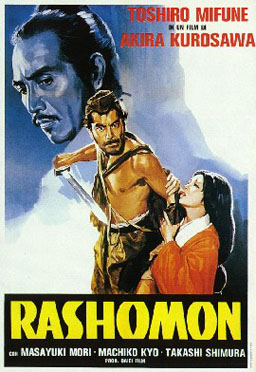Rashomon
|
|
 |
Recommended |
|

Akira Kurosawa is rightfully revered as one of the greatest directors, producers, and screenwriters the world has ever known. To me, his greatest masterpiece was portraying the simple poignancy of a humble government worker's life and death in Ikiru, but every Kurosawa film has its devotees. Among the most beloved is Rashomon, which is credited with opening Japanese cinema to the world through its success at the 1951 Venice Film Festival, and later winning the Best Foreign Language Film Oscar.
Like most brilliant stories, Rashomon has all the appearance of simplicity. There are only a handful of characters, who appear in three settings (a gate, a forest, and a courtyard). In the relentless glare of a hot, sunny day, a woman (Machiko Kyo) was raped, her husband (Masayuki Mori) was murdered, and the notorious thief Tajomaru (incredibly charismatic Toshiro Mifune) has been accused of both crimes.
Tajomaru proudly confesses to both deeds--perhaps it would be more accurate to say that he boasts of them. But the woman in question has a very different story to tell. The dead man himself has his own version of events, which he relates through a spirit medium. Later, a woodcutter (Takashi Shimura) claims he witnessed everything and contradicts them all.
A small group of men wait out a pouring rainstorm at Rashomon gate and wonder what really happened in the forest.
Most viewers probably begin watching Rashomon with the same intent. Tajomaru blusters and the woman weeps and the medium intones before judges we never see. The scenes are shot so the audience is almost made to feel as if they are sitting in the judges' position--but not quite. Those who try to hit upon the exact and ultimate truth will be disappointed. The movie is less about unlocking a mystery and more about the elusive nature of truth. Each charactor's narration of events had the interesting twist of revealing more about how he saw himself than what actually happened.
The actors had the challenge of portraying their characters differently yet recognizably in each telling of the story, and they did this stunningly. Kyo in particular has the most dramatic changes from scene to scene, depending on who was watching her. Her role alone is an interesting exploration of the various dichotomies of being a woman; she is a helpless, "childlike" victim, she is an honorable wife whose purity has been outraged, she is maddened with rage and hell hath no fury like a woman scorned.
Other movies have explored the impossibility of perfectly reliable witnesses and undeniable truth, but it is so easy for them to feel frustratingly incomplete. Rashomon transcends the need to establish absolute truth to complete a plot or organize its world. Its documentation of the few hours three people spent together in a forest powerfully demonstrates the hopeless complexity of truth when it is entrusted to the memories and perceptions of humans. Yet its ending, involving an abandoned and adopted baby, shows that this same complexity is also humanity's hope. Absolutism and perfect consistency might be comforting in theory, but they are too unforgiving in a world of individuals.


" data-width="100%" data-numposts="5">